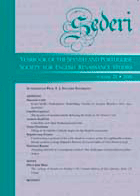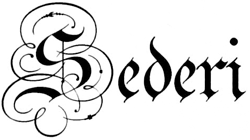
Sederi 25
Sederi 25 — 2015
EDITORS
Berta Cano Echevarría & Ana Sáez-Hidalgo
REVIEW EDITOR
Francisco J. Borge López
ISSN 1135-7789
Andrew Hadfield, “Grimalkin and other Shakespearean Celts.” SEDERI 25 (2015): 55-76.
DOI: https://doi.org/10.34136/sederi.2015.3 Download PDF
Abstract
This essay examines the representation of Ireland and Celtic culture within the British Isles in Shakespeare’s works. It argues that Shakespeare was interested in ideas of colonisation and savagery and based his perceptions on contemporary events, the history of the British Isles and important literary works such as William Baldwin’s prose fiction, Beware the Cat. His plays, notably The Comedy of Errors and Macbeth, represent Protestant England as an isolated culture surrounded by hostile Celtic forces which form a threatening shadowy state. The second part of the essay explores Shakespeare’s influence on Irish culture after his death, arguing that he was absorbed into Anglo-Irish culture and played a major role in establishing Ireland’s Anglophone literary identity. Shakespeare imported the culture of the British Isles into his works – and then, as his fame spread, his plays exported what he had understood back again, an important feature of Anglo-Irish literary identity, as many subsequent writers have understood.
Keywords: Colonisation; drama; English Renaissance Literature; Ireland; savagery; Shakespeare; James Shirley.
References
Bacon, Francis 1972. Essays. Ed. Michael Hawkins. London: Dent.
Baker, David J. 1997. “Where is Ireland in The Tempest?” Eds. Mark Thornton Burnett and Ramona Wray. Shakespeare and Ireland: History, Politics and Culture. Basingstoke: Macmillan.
Baldwin, T. W. 1965. On the Compositional Genetics of The Comedy of Errors. Urbana: University of Illinois Press.
Baldwin, William 1988. Beware the Cat: The First English Novel. Ed. William A. Ringler, Jr. and Michael Flachmann. Huntington Library: San Marino, California.
Bate, Jonathan. 2008. Soul of the Age: The Life, Mind and World of William Shakespeare. London: Viking.
Bradshaw, Brendan, Andrew Hadfield and Willy Maley, eds. 1993. Representing Ireland: Literature and the Origins of Conflict, 1534-1660. Cambridge: Cambridge University Press.
Bullough, Geoffrey 1962. Narrative and Dramatic Sources Of Shakespeare. 8 Vols. London: Routledge.
Connolly, S. J. 2007. Contested Island: Ireland 1460-1630. Oxford: Oxford University Press.
Derricke, John 1883 (1581). The Image of Irelande. Ed. J. Small. Edinburgh: Adam and Charles Black.
Edwards, Philip 1979. Threshold of a Nation: A Study in English and Irish Drama. Cambridge: Cambridge University Press.
Ellis, Steven G. 1985. Tudor Ireland: Crown, Community and the Conflict of Cultures, 1470-1603. Harlow: Longman.
Fletcher, Alan J. 2000. Drama, Performance, and Polity in Pre-Cromwellian Ireland. Cork: Cork University Press.
Greenblatt, Stephen and Peter G. Platt, eds. 2014. Shakespeare’s Montaigne: The Florio Translation of the Essays: A Selection. New York: New York Review of Books.
Gresham, Stephen 1981. “William Baldwin: Literary Voice of the Reign of Edward VI.” The Huntington Library Quarterly 44: 101-16.
Grogan, Jane 2013. “Three Essays on Spenser and the Twentieth Century: Spenser’s Lost Children.” Spenser Studies XXVIII: 1-54.
Hadfield, Andrew 2004. Shakespeare and Renaissance Politics. London: Thomson Learning.
Hamilton, Donna B. 1990. Virgil and The Tempest: The Politics of Imitation. Columbus: Ohio State University Press.
Herron, Thomas. 2013. “War, The Boar and Spenserian Politics in Shakespeare’s Venus and Adonis.” Eds. Willy Maley and Rory Loughnane. Celtic Shakespeare: The Bard and the Borderers. Farnham: Ashgate.
Herron, Thomas 2006. “Plucking the Perrot: Muiopotmos and Irish Politics.” Ed. J. B. Lethbridge. Edmund Spenser: New and Renewed Directions. Madison: Fairleigh Dickinson University Press.
Ivic, Christopher 2013. “Shakespeare’s England/Jacobean Britain.” Eds. Willy Maley and Rory Loughnane. Celtic Shakespeare: The Bard and the Borderers. Farnham: Ashgate.
Knowles, James, ed. 2001. The Roaring Girl and Other City Comedies. Oxford: Oxford University Press.
Lennon, Colm 1995. Sixteenth-Century Ireland: The Incomplete Conquest. Dublin: Gill and Macmillan.
Levack, Brian P. 1987. The Formation of the British State: England, Scotland and the Union of 1603. Oxford: Clarendon Press.
McGuinness, Frank 1997. Mutabilitie. London: Faber.
McMillin, Scott 1999. “Professional Playwrighting.” Ed. David Scott Kastan. A Companion to Shakespeare. Oxford: Blackwell.
Maley, Willy 1997a. Salvaging Spenser: Colonialism, Culture and Identity. Basingstoke: Macmillan.
Maley, Willy 1997b. “Shakespeare, Holinshed and Ireland: resources and Con-Texts.” Eds. Mark Thornton Burnett and Ramona Wray. Shakespeare and Ireland: History, Politics, Culture. Basingstoke: Macmillan.
Maslen, Robert 1997. Elizabethan Fictions: Espionage, Counter-Espionage and the Duplicity of Fiction in Early Elizabethan Prose. Oxford: Oxford University Press.
Middleton, Thomas 2007. The Collected Works. Eds. Gary Taylor and John Lavagnino. Oxford: Oxford University Press.
Morash, Christopher 2000. A History of the Irish Theatre, 1601-2000. Cambridge: Cambridge University Press.
Morgan, Hiram 1995. “The Fall of Sir John Perrot.” Ed. John Guy. The Reign of Elizabeth I: Court and Culture in the Last Decade. Cambridge: Cambridge University Press. 109-25.
Mottram, Stewart 2013. “Warriors and Ruins: Cymbeline, Heroism and the Union of Crowns.” Eds. Willy Maley and Rory Loughnane. Celtic Shakespeare: The Bard and the Borderers. Farnham: Ashgate.
Neill, Michael 1994. “Broken English and Broken Irish: Nation, Language, and the Optic of Power in Shakespeare’s Histories.” Shakespeare Quarterly 45: 1-32.
Ó Ciardha, Éamonn, and Micheál Ó Siochrú, eds. 2012. The Plantation of Ulster: Ideology and Practice. Manchester: Manchester University Press.
Patterson, Annabel 1989. Shakespeare and the Popular Voice. Oxford: Blackwell.
Pettegree, Andrew 2014. The Invention of News: How the World Came to Know about Itself. New Haven: Yale University Press.
Plunket Barton, D. 1919. Links between Shakespeare and Ireland. Dublin: Maunsel.
Power, Andrew 2013. “’Why Should I Play the Roman Fool, and Die / On Mine Own Sword?’: The Senecan Tradition in Macbeth.” Eds. Willy Maley and Rory Loughnane. Celtic Shakespeare: The Bard and the Borderers. Farnham: Ashgate.
Rankin, Deana 2005. Between Spenser and Swift: English Writing in Seventeenth-Century Ireland. Cambridge: Cambridge University Press.
Ringler, William A., Jr. 1978-9. “Beware the Cat and the Beginnings of English Fiction’. Novel 12: 113-26.
Rowley, William, Thomas Dekker and John Ford. 1997. The Witch of Edmonton. Manchester: Manchester University Press.
Shakespeare, William 1975. As You Like It. Ed. Agnes Latham. London: Methuen.
Shakespeare, William 1980. The Tempest. Ed. Frank Kermode. London: Methuen.
Shakespeare, William 1982. Henry V. Ed. Gary Taylor. Oxford: Oxford University Press.
Shakespeare, William 1990. Macbeth. Ed. Nicholas Brooke. Oxford: Oxford University Press.
Shakespeare, William 1999. King Henry VI, Part II. Ed. Ronald Knowles. London: Nelson.
Shakespeare, William 2002. King Richard II. London: Thomson.
Shakespeare, William 2004. The Comedy of Errors. Ed. T. S. Dorsch. Cambridge: Cambridge University Press.
Shapiro, James 2005. 1599: A year in the Life of William Shakespeare. London: Faber.
Sheehan, Bernard W. 1980. Savagism and Civility Indians and Englishmen in Colonial Virginia. Cambridge: Cambridge University Press.
Shirley, James 1640. St. Patrick for Ireland: The first part. London.
Shirley, James 1655. The Polititian, a tragedy. London.
Silke, John J. 1970. Kinsale: The Spanish intervention in Ireland at the End of the Elizabethan Wars. Liverpool: Liverpool University Press.
Sonner, Helen Jeanine 2013. “Print, Rhetoric, and ‘Plantation’, 1571-1641.” Ph. D. thesis. Queen’s University, Belfast.
Tillyard, E. M. W. 1969. Shakespeare’s History Plays. Harmondsworth: Penguin.
